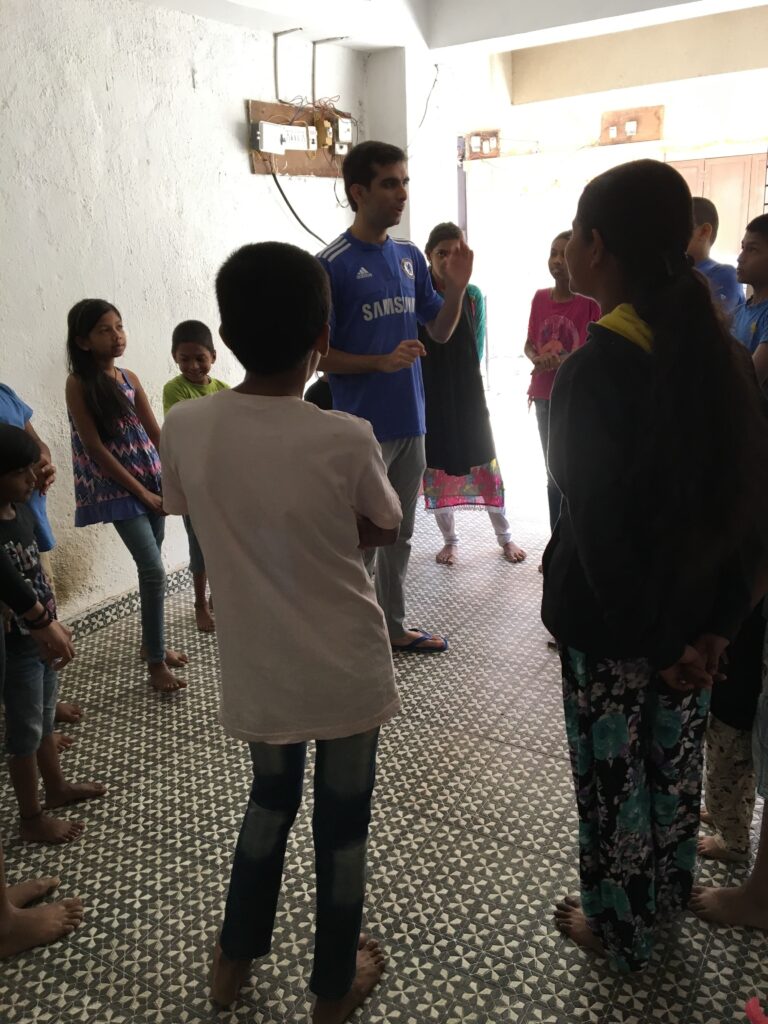Mihil Ramaiya was one of our first volunteers, and is still with Pune Learns after all these years! He has volunteered for the Wanowrie and Kondhwa communities, and works as a software engineer at a start-up. Dig into his journey with Pune Learns!
I have always had the urge to do something for the community. My aim was never to transform it entirely, but maybe I had the potential to take baby steps that’d start making a difference. I was also always fond of kids. What intrigues me is the way they think and how the intelligence and depth of thought shown by kids in the same age group has transformed over the years. Teenagers today post quotes that have deep meanings, when at that age, I could not think of anything beyond posting lyrics of the song that was looping in my playlist.
Whenever my niece visits us from Australia, I pull some random questions out of a hat, and her answers never fail to amaze me. The other day, we went out to buy mineral water for my 2-year-old nephew (yes, India ka paani doesn’t suit him) and I asked my niece if she would like to have a cup of hot chocolate. Most kids at that age (including me), would jump and say yes, but not her. She was not my niece anymore, she was a responsible elder sibling who said, “My brother needs water, that is more important.” This made me realize that the term “childish thinking” is not relevant. Children have very complex thought processes and I wanted to learn about them.
In my final year of engineering, I heard that Pooja and Tanvi had started this community where they spent a couple of hours every weekend teaching English. The kind of English teachers I had in high school, got it onto the list of my most-liked subjects. So at the end of the day,
“English + kids + community = Win-win”
When I signed up, I was just expecting to give in a couple of hours and teach kids. But turns out, it was so much more. Over the course of 4 years of volunteering, I have learned quite a bit. My interest in learning how children think helped me establish a connect with the kids. It was Pune Learns that taught me the importance of forming that bond of trust. There are a few things which the children would not share with friends or teachers. However, to them, the bhaiyas and didis who visit them every Sunday, seem capable enough to help them with their dilemmas. This experience of forming trust isn’t limited to the kids, the parents also find us more approachable. While we’re teaching, the parents are quite observant, and they understand that we use positive reinforcement while teaching. That helps them establish a comfort level in discussing their children’s behavior with us. They know that instead of using a punishment, bhaiya or didi will share an anecdote that will be more relatable to them.

Positive reinforcement is a technique that has proven to be really helpful for our kids, and is one of the key aspects of my teaching approach. One of our students was a 6-year-old girl who had stage fright. She was quite talkative with her peers, however, she was scared to answer questions or speak on stage. I started digging and figured out that this was much more than stage fright. She was low on confidence since she went to a Marathi medium school, and public speaking in English would be nothing less than a nightmare (and she cannot be blamed for this, anyone would lack confidence if asked to speak in a language they’re not comfortable with). One option in front of me was to continue to push her to speak on stage in spite of her fear, but I decided to use an incremental learning approach and fix this over time.
The first step was simple and she aced it. I gave her a topic and asked her to discuss it with her friend (in any language she was comfortable with) while I was a silent observer. Next, I asked her to discuss some topic with me in any language. She was fine here too. It was time then, for some public speaking. I sent her on stage and asked her to speak, but she was not alone. I asked her to discuss the topic on stage with her friends while we observed her. She did that pretty well. Next, she was sent alone on stage, and I asked her to focus on the volunteers or her elder brother. We provided her the leeway to speak in any language she wanted, translated the same in English and asked her to repeat in English. This went on for some time and she started getting more confident. The Eureka! moment for all of us was when she raised her hand after we asked who would like to speak about an impromptu topic? (The topic was whether TikTok was good or bad, she spoke about how good TikTok was. Yes, there is still some work to be done, but we’ve managed to get over stage fright and confidence issues!).
This incremental teaching approach greatly benefitted the students, and they have grown into confident and inspiring children before my very eyes. Little did I know that this entire process would also teach me so much. The experience every Sunday is like Newton’s third law of motion. Not only do I use the incremental learning approach on the kids, but also incrementally learn from them. Learning, both about how children think, and how they respond to situations, which in turn has helped me become a better support system for these incredible students. And it continues!
– By Mihil Ramaiya
View this post on Medium.